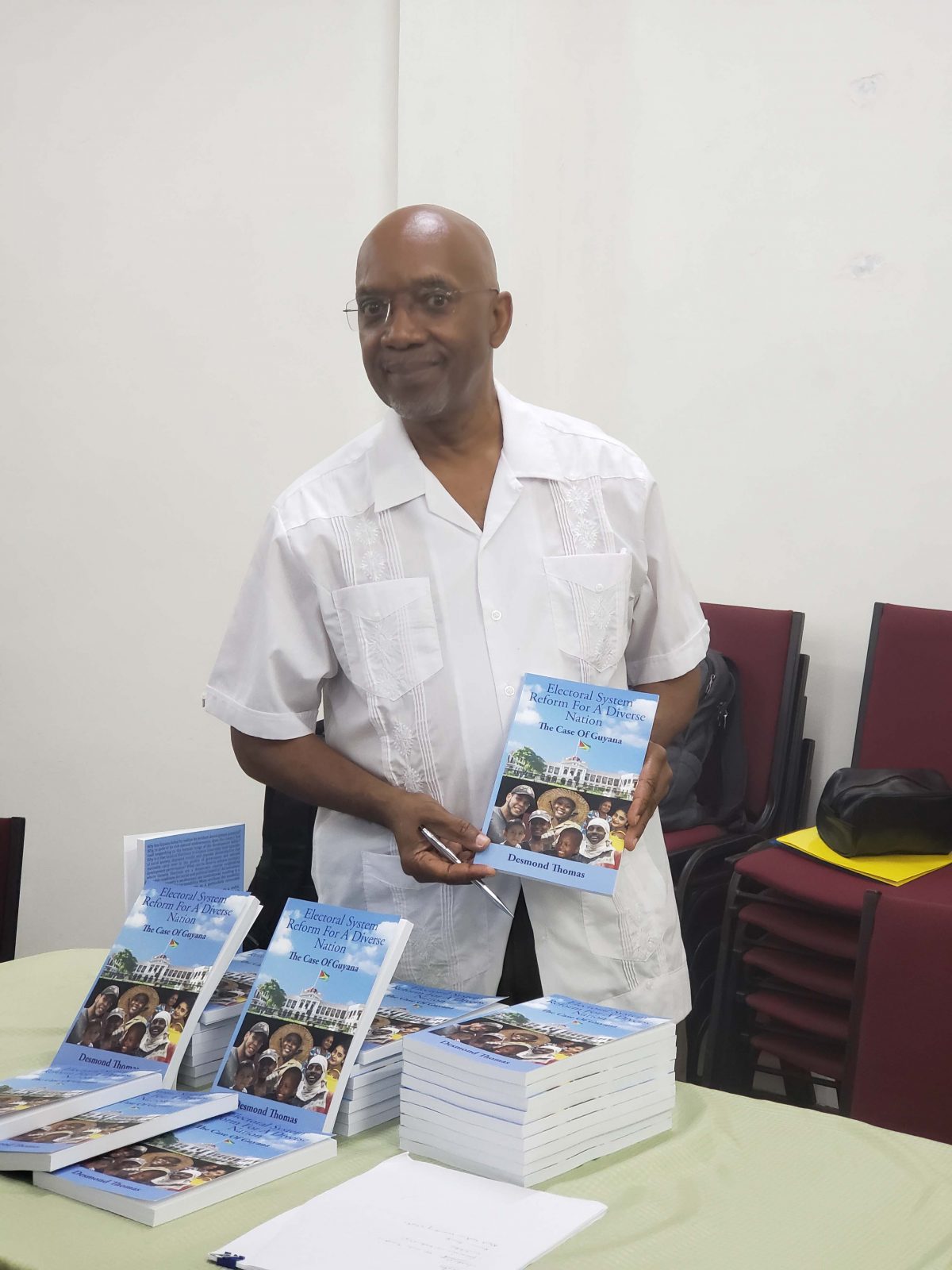Local economist Dr Desmond Thomas on Friday launched his new book, titled, ‘Electoral System Reform for a Diverse Nation, The Case of Guyana.’
The launch, which was held at the National Library, included a presentation on the book by Thomas, who told attendees that he wrote the book because he believes that electoral reform is the number one priority for development in this country and for people to realise that change can happen. He said if someone wants to make a difference in Guyana, they should think about electoral reform because Guyana has been underperforming for 50 years.
“If you want to make a difference to the political conditions of the country, the number one instrument is electoral reform,” he stressed, before adding that the objective of electoral reform is to change political behaviour.
“It’s not to change government, it’s to change political behaviour and it can only be done through the changes of the political incentives that are in the electoral system. If we were to change our electoral system, the very next election there will be an impact but over time, people behaviour will change because people will start to respond to the incentive framework in the electoral system,” Thomas added.
Additionally, he said that the discovery of oil here makes electoral reform and political transformation more urgent in order to achieve the unity and constructive engagement that is necessary for Guyana to do better. “The biggest obstacle to electoral reform…or any kind of institutional change in this country is skepticism; after 50 years of living in this electoral system, nobody believes that we can do better,” he said.
Thomas revealed that the book has three parts; first, the introduction, which basically defines and discusses electoral reform in addition to revealing what is discussed in the book. “This book is about changes to the electoral system, not the administration, not the operational side of it, not [the Guyana Elections Commission]. It’s about the electoral system,” he said, while noting that he was motivated to write about the elements after seeing many discussions in the newspapers and he wanted to ensure that persons understand.
The second part of the book, Thomas continued, explores problems of the current electoral system and what bonus, wasted or spoiled votes mean. “There are a lot of technicalities that we need to understand. The second part deals with that,” he said, before adding that the ending of the seventh chapter deals with the issues of ethnic diversity.
Continuing on that topic, he said that ethnic diversity is a major issue in Guyana; one which needs to be addressed in order for the country to move forward. “To move forward, we need to solve the ethnic problem,” he stated.
Meanwhile, the third part of the book deals with Guyana’s electoral systems and addresses the issues of the system including the way it was formed when Guyana gained its independence. Thomas said that the current electoral system was influenced by politics in the 1950s and 1960s, which is one reason why Guyana needs to urgently review it. The author explained that the political system was formed during one of Guyana’s most “turbulent” times. The end result, he said, “we ended up with a highly polarised system and the identification of the two major parties with the two races has institutionalised the racial problem.”
In addition, Thomas said, he included a few of his suggestions of electoral reform in the book. He said he is not suggesting that the entire system be scrapped. Instead, he said, Guyana should start from reviewing the system. Some of his proposals include maintaining the member party proportional setting but changing the constituency part to plurality systems. He added that he would increase the number of constituency components from 25 to “maybe 50 seats, in addition to increasing the number of constituencies in areas like Georgetown.”
During the question and answer session after his presentation, a number of persons complimented Thomas for taking “such a bold step in writing and publishing a book like this at this time.” One even suggested that the book be used in secondary schools saying that in order for change to occur, persons must be taught about the electoral system from a young age. Everyone agreed with her suggestion. Another attendee, Sara Bharrat, said that electoral reform is inevitable and it wouldn’t long before the change will occur.
Thomas is an economist with decades of academic experience and professional service. He has lectured at several universities at home and abroad, and held positions as a statistician at the Caribbean Community Secretariat, acting Economic Adviser to the President of Guyana and Lead Economics Specialist at the Inter-American Development Bank. His previous publications have focused mainly on macroeconomic issues but this book reflects a wider interest in themes related to improving social living standards and conditions.
Thomas presented the library with four copies of the book, which is available for purchase at Austin’s Book Services on Church Street.




